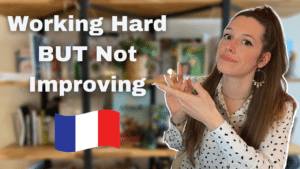Transcript
Many French people who do not use it are annoyed by those who do use it and put it everywhere. Shall we go or not? If you want to speak like a French person, you have to use this expression "j'avoue".
Hello everyone, welcome to this new French lesson. We are going to see together four expressions that have almost become tics of language for some and many French people. This will help you to better understand exchanges between French people, whether in the street or on television, in series or in movies.
🇫🇷 Comprends les Français even when they talk fast.
"15 minutes a day is enough to be able to understand French speakers, even when they speak fast. You just need to follow the right method“
🚀 50 everyday dialogues to boost your understanding of French
✅ Understand the French, even when they're talking fast.
✅ Talk with French speakers with confidence.
✅ Improve your French for good with a method based on everyday dialogues.
Let's start with a first expression that is used a lot by the French. This expression is "j'avoue". If you want to speak like a French person, you must use this expression "j'avoue". Of course, in a familiar language register. J'avoue is used instead of "je suis d'accord". The first meaning of the verb to confess, it means to tell the truth. For example, we will say the murderer confessed the crime. Or my little brother confessed to eating all the cookies.
So we end up telling the truth. You admit that you did something. But in everyday language, when someone says "I confess", it just means they agree. It means you're right, I agree with you. We're not going out if it's raining. I admit, you're right. You must be really hungry. You didn't eat anything for breakfast. I admit, I didn't even realize it. You're not gonna wear red pants with a pink sweater, are you? I'll admit, it doesn't really go together.
The second expression? I don't like it very much. I find it a bit annoying, but you hear it in the mouths of many French people. It's "ou bien". It's an expression that doesn't add much value to a sentence. I'll give you some examples and then I'll explain. "Shall we go or shall we?" "Do you manage to put on your coat or shall we?". Or it's an expression we'll use in French to show impatience. We start by being annoyed. Can you put your coat on or not? It is implied that the person is a little slow, that he/she has difficulty closing the zipper.
Or if you say to someone, "Are we going or not?" You mean he's a little slow, he should hurry up a little. By itself, in terms of meaning, it doesn't add any value, but you add that or else a little bit to show your annoyance, your impatience.
Contrary to what you might think, because obviously, in French, the "ou" is used to propose an alternative. Do you want a tea or a coffee? Here, it is of course not the case.
The third expression very often used in speech by the French is "en fait". The expression "in fact" is used very often and again does not add much value to a sentence. You see, he is actually nice. You're right, in fact, there's no more train, I'll take the car. This expression means "in the end", but it is not very useful. For example, I could have said "you see, he's really nice, you see, he's nice" or "you're right, there's no more train, I'll take my car".
It's a slightly superfluous expression, but it gives rhythm to a conversation, to an exchange. "In fact", gives the impression of linking different pieces of the sentence.
And finally, the last expression we're going to see today is "du coup". A lot of French people who don't use it are annoyed by those who do and sometimes use it. Recently, I saw a board on social networks that mocked people who used "du coup", in all their sentences, there was a column with written old French and French in 2022.
So for example, instead of using thus, therefore, therefore, that's why, therefore, finally, if I understand well, there is a whole list of words that we will simply replace by "du coup". This expression has become a real language tic. Sometimes, in the same sentence, you can hear a French person use it three times. So, if we go to the sea, we'll have to go back home to change because we won't go to the restaurant with our bathing suit.
Of course, here I used it in an exaggerated way. Sometimes it's just used, like I was telling you, as a synonym for ultimately. For example, I might say "did you get a burger or a pizza in the end?" I mean in the end, did you choose a burger or a pizza?
That's it for today. If you liked this video, put a "like" and of course, subscribe
I'll see you next week.








